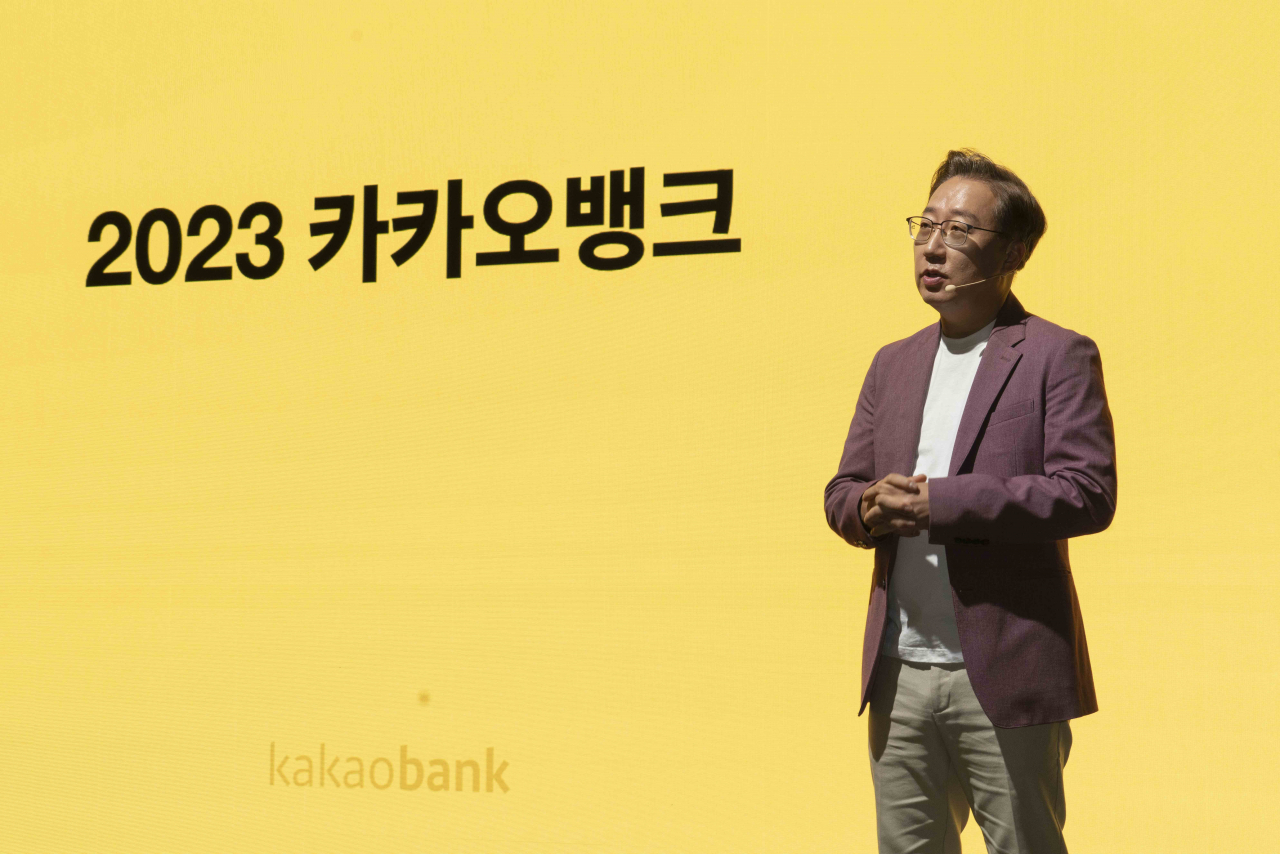Can KakaoBank pioneer global expansion?
Finding a right local partner, enhancing brand awareness in overseas markets remain as crucial tasks
By Song Seung-hyunPublished : May 31, 2023 - 12:01

KakaoBank, the largest internet-only bank in South Korea, hopes to replicate its domestic success in overseas markets, aiming to become the first Korean internet-only bank to pioneer international expansion.
Having built a substantial user base since its launch in 2017, the largest internet-only bank in South Korea has demonstrated the benefits of branchless banking to financial consumers in the country.
Led by CEO Yoon Ho-young, who secured his fourth two-year term in March, KakaoBank is spearheading an ambitious overseas expansion project, particularly targeting the Southeast Asian market.
Among the three internet-only banks in Korea -- KakaoBank, K bank and Toss Bank -- none of them have expanded abroad thus far.
“Currently, we are having talks in two Southeast Asian countries. It is expected that we will be able to announce a tangible result from one of these discussions by the end of this year,” Yoon said during a press conference held in Seoul in April.
Earlier, Yoon, who led the creation of the internet-only bank as a one-member task force within the tech giant Kakao, expressed his desire to extend the bank's services beyond Korea following its initial public offering in 2021.
A portion of the funds raised from the IPO, approximately 50 billion won, has been earmarked for entering overseas markets.
Kakao Bank believes that its competitive edge lies in its ability to optimize the user experience.
In Korea, its user interface let Korean users create accounts and transfer money without the need for cumbersome accredited certificates before any other bank. This advantage has resulted in the bank achieving the fastest turnaround to profitability among global fintech companies, according to a KakaoBank official.
The lender swung to a profit for the first time in the first quarter of 2019, recording a net profit of 6.56 billion won. This milestone was reached within just one year and eight months since its establishment.
“While the popularity of Kakao Talk (South Korea's No. 1 messenger app operated by Kakao), has played a role in the bank's success, it is important to note that users have to download a separate banking app. We see that our unique UI and services have been instrumental in our achievements,” a KakaoBank official told The Korea Herald.
The official further explained that many Southeast Asian companies are impressed by these competitive aspects and have approached the Korean firm.
KakaoBank declined to confirm industry assessments that Indonesia was the most promising candidate for KakaoBank’s global expansion.
According to a survey report by McKinsey & Company in the fourth quarter of 2021, Indonesia has a market with substantial progress in digital banking adoption. The survey revealed that 78 percent of Indonesian customers actively use digital banking at least once a month, a notable increase from 57 percent in 2017.
Furthermore, 80 percent of Indonesian participants expressed their expectation to maintain or increase their use of digital banking in the future.
The promising market conditions in Indonesia also have captured the attention of the top four Korean commercial banks -- Hana, Shinhan, Woori, and KB Kookmin -- all of which have already made inroads into the market.
However, their performance there in the first quarter of this year revealed mixed outcomes, indicating that the Indonesian market has not been smooth sailing, even for the leading lenders.
While Woori and Hana reported net profits exceeding 100 billion Korean won each, Shinhan and KB Kookmin incurred losses of 1.5 billion won and 33.6 billion won, respectively.
Among the four banks, Woori Saudara Bank emerged as the top performer in Indonesia during the first quarter, recording earnings of 19 billion won.
This profit can be largely attributed to the acquisition of Saudara Bank in 2014, according to a Woori Bank official.
“The widened network has resulted in a balanced portfolio, with corporate finance and retail finance proportions now being evenly split,” the Woori Bank official added.
With the acquisition, Woori Saudara Bank has 159 branches across the country as of March. This network comprises 29 regular branches and 130 smaller branches, primarily focused on basic transactions such as savings and deposits. Prior to the acquisition, Woori Bank's Indonesian unit operated only eight branches in total.
This is why some industry insiders stress the importance of KakaoBank securing the appropriate partner to bolster its competitiveness in the Indonesian market, regardless of the method chosen for its entry, be it through acquisition or a straightforward partnership agreement.
Currently, there are digital banks in Indonesia that offer similar services to KakaoBank including Jenius by BTPN, TMRW by UOB, and Digibank by DBS.
Several tech firms also have introduced their own internet banking services, such as Seabank by Sea and Bank Jago by Gojek.
Finding a right partner is particularly crucial considering KakaoBank's limited brand awareness overseas.
Although the bank could leverage the popularity of the Kakao Talk messenger app in Korea for expansion, the situation is vastly different in Indonesia, where WhatsApp currently dominates the market with a market share of over 86.4 percent as of April last year.



![[Exclusive] Korean military set to ban iPhones over 'security' concerns](http://res.heraldm.com/phpwas/restmb_idxmake.php?idx=644&simg=/content/image/2024/04/23/20240423050599_0.jpg&u=20240423183955)

![[Graphic News] 77% of young Koreans still financially dependent](http://res.heraldm.com/phpwas/restmb_idxmake.php?idx=644&simg=/content/image/2024/04/22/20240422050762_0.gif&u=)



![[Pressure points] Leggings in public: Fashion statement or social faux pas?](http://res.heraldm.com/phpwas/restmb_idxmake.php?idx=644&simg=/content/image/2024/04/23/20240423050669_0.jpg&u=)










